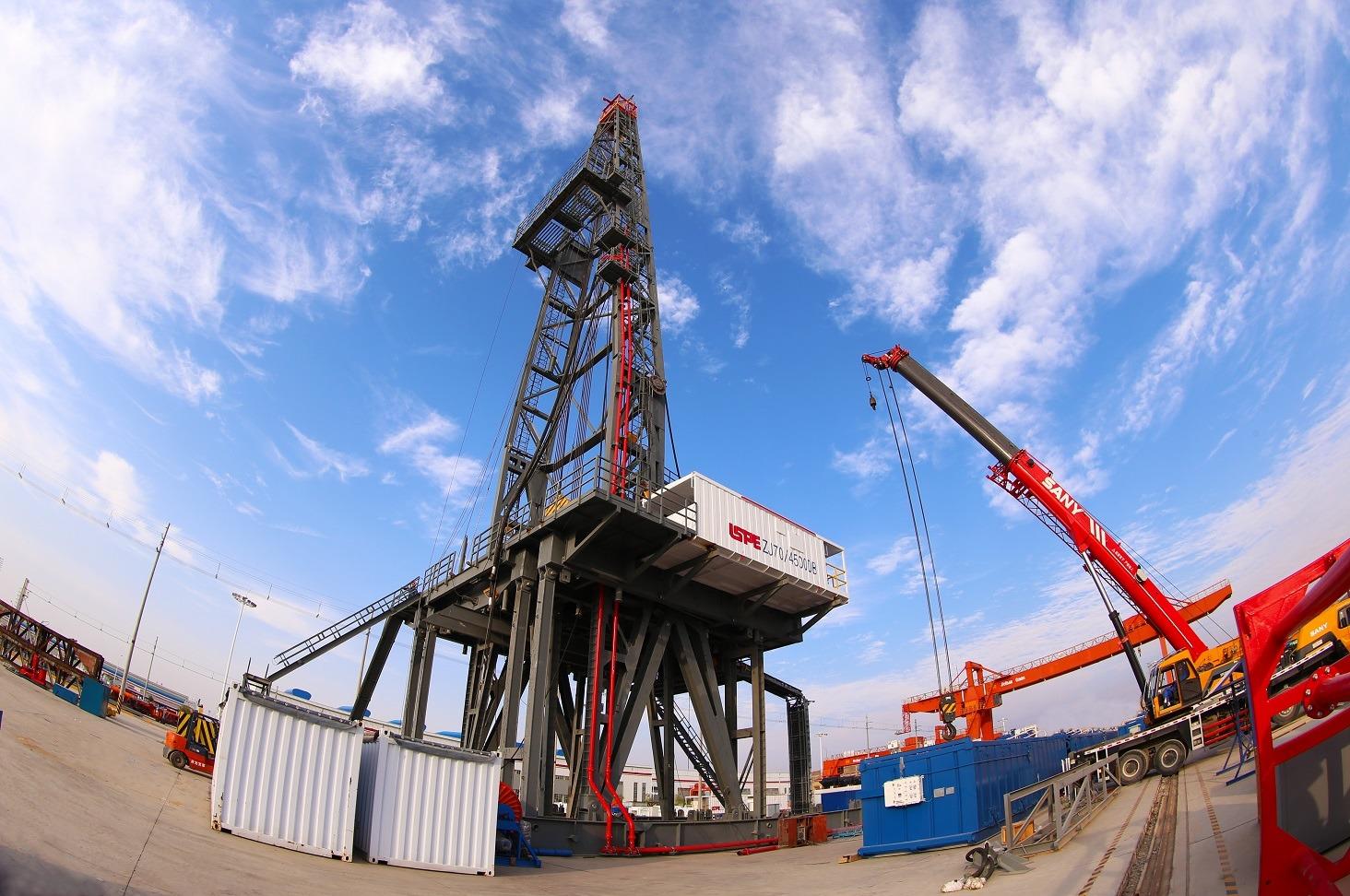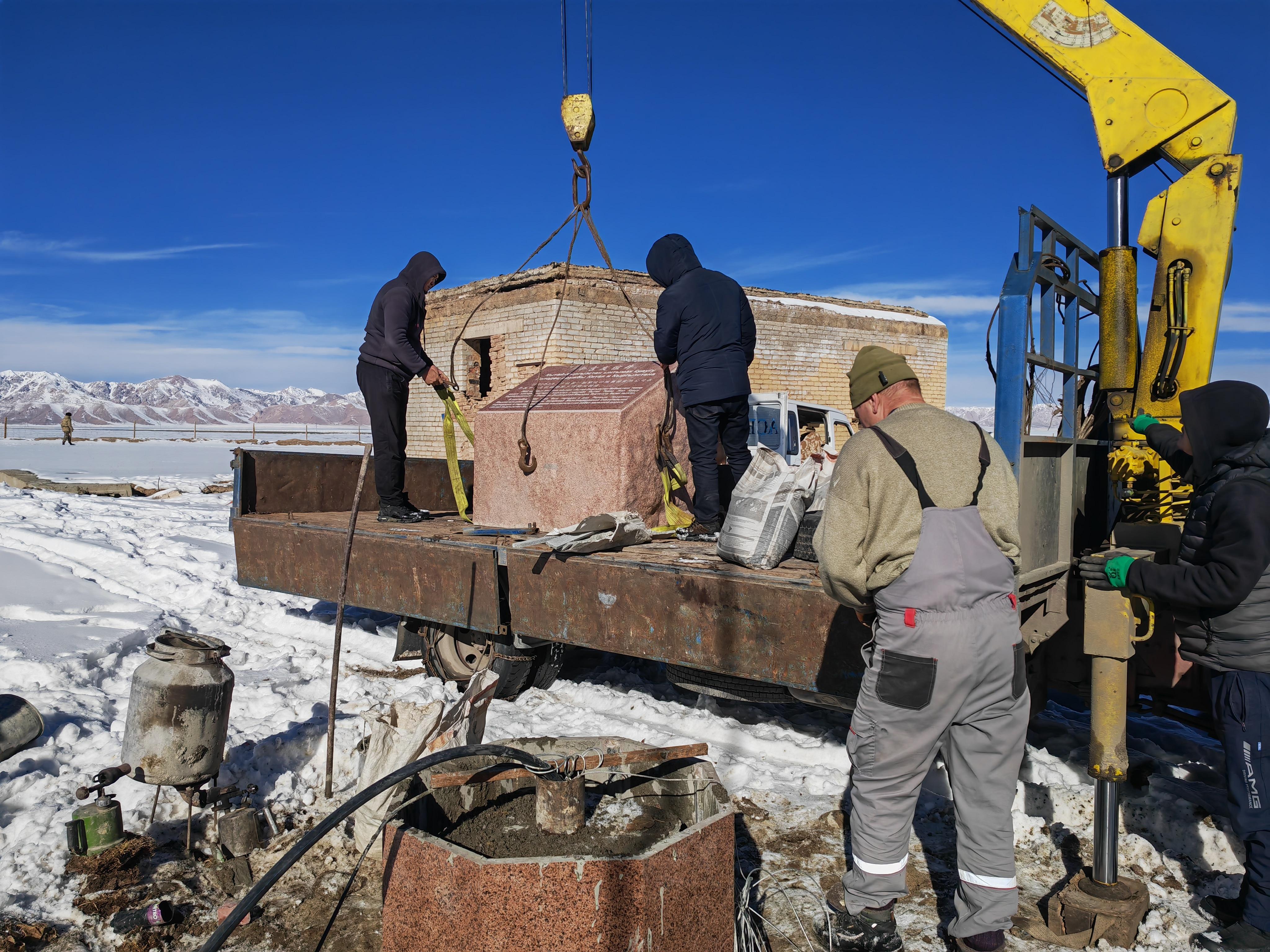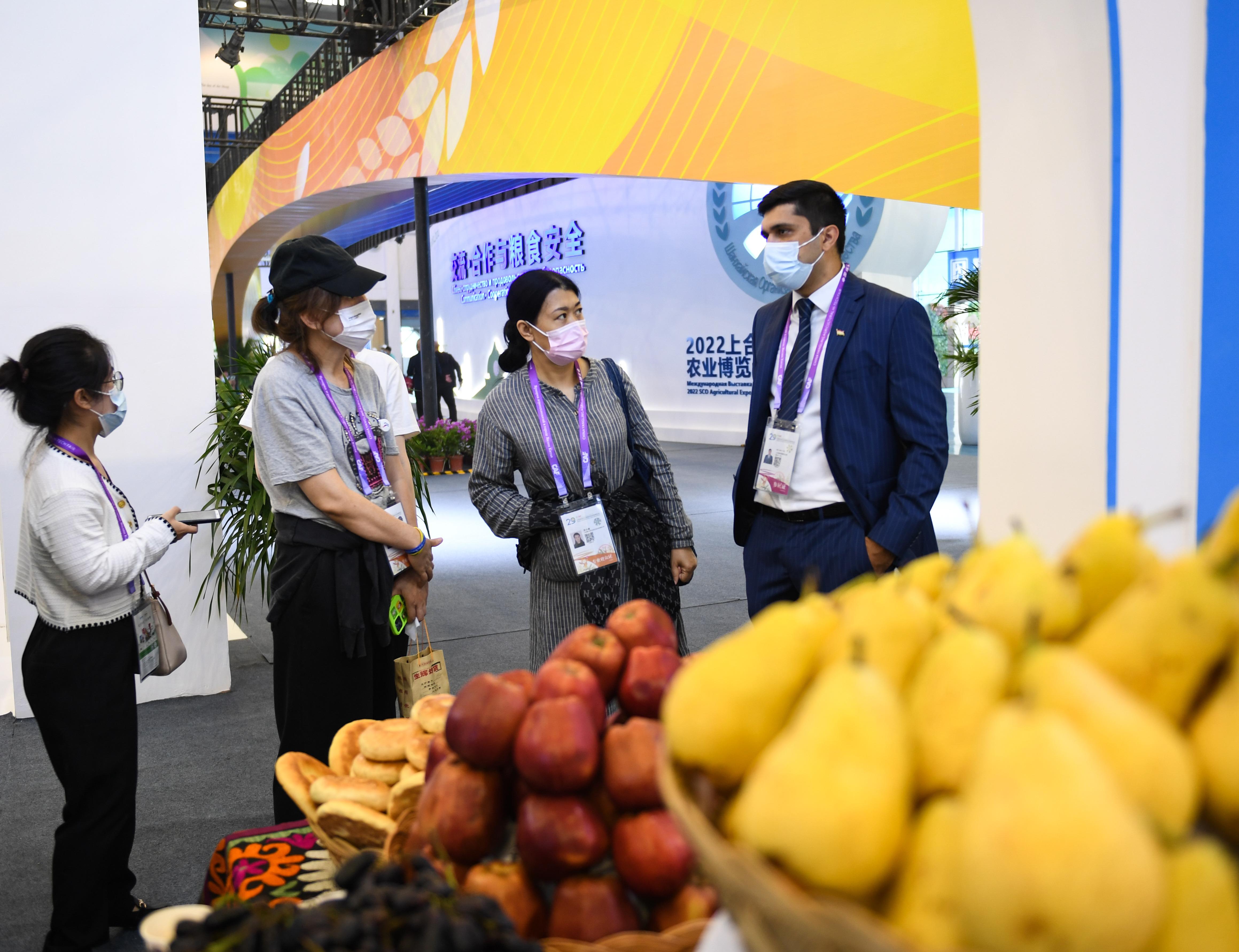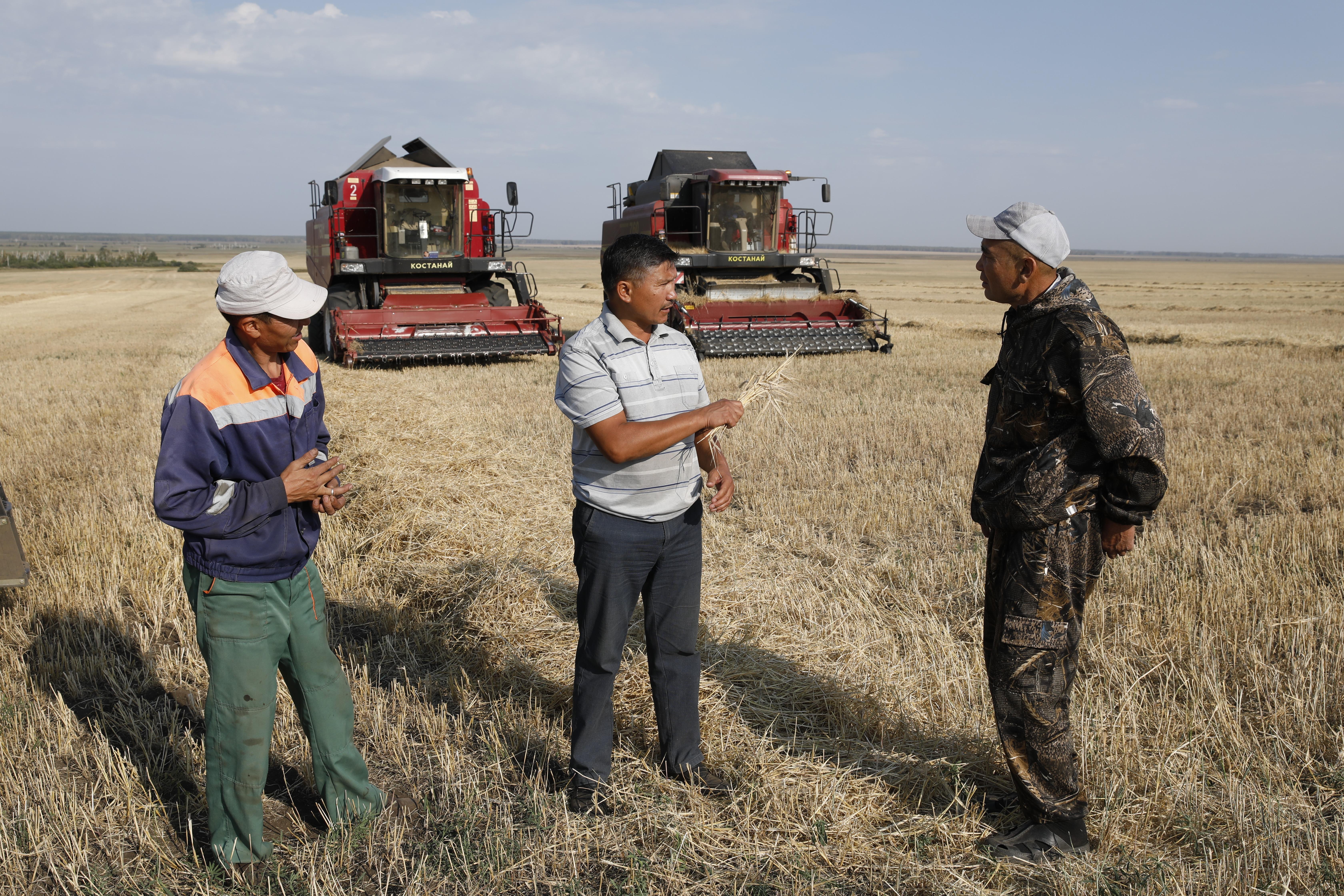Xi'an gathering to boost economic and trade collaboration
 A road is built by Chinese constructors in Kyrgyzstan. (PHOTO / XINHUA)
A road is built by Chinese constructors in Kyrgyzstan. (PHOTO / XINHUA)
Flour, edible oil and honey products from Kazakhstan have long been available at markets in Xi'an, Shaanxi province, offering the city's residents a range of choices to make their favorite steamed bread or biangbiang noodles.
Once the starting point of the ancient Silk Road, the city became an important market for produce from Kazakhstan after Xi'an Aiju Grain and Oil Industrial Group launched a series of projects to partner with farmers in Central Asia. The company is one of the main food processors and traders in Xi'an.
Liu Dongmeng, deputy general manager of the group, said the projects, inspired by the Belt and Road Initiative, have delivered win-win outcomes for Kazakh farmers, businesses and Chinese consumers.
"Through these projects, we have put better food on residents' tables in Shaanxi, in addition to helping growers in Central Asia put food on their own tables," he said.
 Drilling machines work at an oil plant in Uzbekistan. (PHOTO / XINHUA)
Drilling machines work at an oil plant in Uzbekistan. (PHOTO / XINHUA)
Liu added that the company's projects in Kazakhstan have made it easier for local farmers to sell their produce at higher prices. They have also driven growth of the warehousing and transportation sectors, and created more than 1,100 jobs.
The group's projects in the Central Asian nation include an oil processing plant and orders to obtain produce from 100,000 hectares of wheat and oil crops. Together, they are just one of the many wide-ranging cooperation projects launched between China, Kazakhstan, Uzbekistan, Kyrgyzstan, Tajikistan and Turkmenistan.
On Thursday and Friday, the heads of state of China and the five Central Asian countries are due to gather in Xi'an for the first China-Central Asia Summit. Many analysts and business leaders have voiced high expectations that the event will take economic and trade cooperation to a higher level and deliver more tangible benefits to people from the six nations.
Zhao Huirong, a research fellow at the Chinese Academy of Social Sciences' Institute of Russian, Eastern European and Central Asian Studies, said the summit's priority is to advance economic and pragmatic cooperation, and establish platforms in various sectors to increase economic and trade cooperation.
 Workers check a well dug by Chinese engineers in Kyrgyzstan. (PHOTO / XINHUA)
Workers check a well dug by Chinese engineers in Kyrgyzstan. (PHOTO / XINHUA)
She said the timing of the event is special, as this year marks the 10th anniversary of the BRI, and the past decade has witnessed stronger political mutual trust, enhanced security cooperation and exponential economic cooperation between China and Central Asia.
China has been the largest or main trading partner of Central Asian countries for years, and the total trade volume between China and the five nations reached a record $70 billion last year, data from China's National Development and Reform Commission show.
President Xi Jinping proposed the Silk Road Economic Belt, the forerunner of the BRI, in Central Asia. Beijing has signed cooperation agreements on jointly building the BRI with all five Central Asian countries, with Tajikistan being the first nation globally to sign such an agreement with China.
"While there is strong enthusiasm among China and the Central Asian countries for cooperation, problems still have to be resolved, and there is potential yet to be unleashed," Zhao said.
She highlighted the importance of the two sides further promoting trade and investment facilitation, ensuring the security of investments, and further refining the trade and investment structure.
 Visitors to an expo in Xi'an, Shaanxi province, are attracted by fruit from Tajikistan. (PHOTO / XINHUA)
Visitors to an expo in Xi'an, Shaanxi province, are attracted by fruit from Tajikistan. (PHOTO / XINHUA)
Strong commitment
The gathering in Xi'an follows a virtual summit last year to mark the 30th anniversary of diplomatic relations being established between China and the Central Asian countries. At this event, Xi announced a plan to provide grant assistance of $500 million to the five nations to support livelihood programs.
The two sides pledged at the virtual summit to build an even closer China-Central Asia community with a shared future to promote the nations' high-quality development and the region's prosperity and stability.
Last month, a meeting of foreign ministers from China and the Central Asian countries underlined interconnectivity as the priority for cooperation between the two sides and agreed to build a multidimensional and comprehensive network featuring the integration of roads, railways, airlines and ports.
The ministers also agreed to expand cooperation in areas such as trade, investment, agriculture, new energy and e-commerce, and to take steps to enable easier customs clearance and quarantine procedures in promoting trade facilitation.
Ivona Ladjevac, deputy director of the Institute of International Politics and Economics in Belgrade, the Serbian capital, said Central Asia is a pivotal region for world peace and security, and is known for its huge deposits of natural gas, oil reserves and other mineral wealth.
 Farmers in Kazakhstan, who partner with Xi'an Aiju Grain and Oil Industrial Group, harvest wheat that can be made into biangbiang noodles. (PHOTO / XINHUA)
Farmers in Kazakhstan, who partner with Xi'an Aiju Grain and Oil Industrial Group, harvest wheat that can be made into biangbiang noodles. (PHOTO / XINHUA)
The region has great potential for economic growth, and widening infrastructure links between the five landlocked countries and China will deliver win-win results, she said.
"There is no doubt that every effort will be put into building a closer China-Central Asia community with a shared future, which will contribute to regional and world peace, stability, development and prosperity," Ladjevac added.
Azamat Sulimanov, a researcher at the Institute for Strategic and Interregional Studies under the President of Uzbekistan, said unleashing transportation potential in Central Asia remains one of the top priorities for China and the five countries in bolstering their BRI cooperation.
He highlighted the significance of the China-Kyrgyzstan-Uzbekistan Railway project in unleashing the potential for regional growth. During Xi's visit to Uzbekistan in September, the three nations signed a memorandum of understanding, or MOU, on cooperation in constructing the Kyrgyzstan section of the railway. They are scheduled to complete feasibility research on the rail link in the first half of this year, the MOU states.
Implementation of this project will significantly shorten the route from East Asia to countries in the Middle East and southern Europe by up to 900 kilometers, and the delivery time for goods by seven to eight days, Sulimanov said.
"This will undoubtedly have a positive impact on the growth of China's mutual trade with Central Asian countries, in particular with Uzbekistan," he said.
 Workers monitor production at a petrochemical plant in Uzbekistan, which has attracted investment from Chinese companies. (PHOTO / XINHUA)
Workers monitor production at a petrochemical plant in Uzbekistan, which has attracted investment from Chinese companies. (PHOTO / XINHUA)
Rising optimism
The summit between China and the Central Asian countries has also bolstered confidence among businesses to further explore market potential.
Wang Wentao, China's minister of commerce, said at a meeting with the ministers of economy and trade from the five countries last month that China's direct investment in Central Asia reached $15 billion by the end of last year.
"We have jointly implemented a number of cooperation projects on oil, gas and mining, processing and manufacturing, and connectivity and digital technology, which have brought tangible benefits to the people of these countries," he said.
Nafis Samatova, a document manager for a wind power project being built by China Energy INTL Group CAS CO in Uzbekistan, said he is glad he joined the project, "as it provides a valuable opportunity for sharing experience and knowledge".
"The project is crucial for my country's development, because it promotes renewable energy sources and reduces dependence on fossil fuels. Moreover, it provides job opportunities for local people and contributes to the economic growth of the region, creating around 500 positions during the construction phase," he said.
Benedikt Sobotka, chief executive of Eurasian Resources Group, in which the Kazakh government holds a 40 percent stake, said he expects the China-Central Asia Summit to enhance joint projects between all parties, "with the aim of extracting further synergies and increasing regional prosperity".
"It is a real milestone in the history of the development of relations between China and Central Asian countries," he said.
Sobotka added that his company has strong ties with Chinese stakeholders, with a significant portfolio of joint ventures, and China is also a highly important strategic market and key sales destination for the group, accounting for more than one-third of its total sales volume.
The BRI enables greater access to markets across Central and East Asia, allows for increased trade volumes, and more effectively connects Central Asian countries with global markets, further enhancing trade and prosperity, he said.
Liu, from Xi'an Aiju Grain and Oil Industrial Group, said the company is looking to further diversify its product categories in trade with Central Asia.
He said the group's agricultural cooperation project, which facilitated imports of high-quality produce from Central Asia, also helped China strengthen its food security and diversify its sources of agricultural imports.
"The upgrading of ties between China and Central Asia has paved the way for our transformation from a domestic company to a global food processor and trader," he said.
"We will definitely try to seize this opportunity, improve our capacity in conducting trade, and build up our presence in Central Asia."


